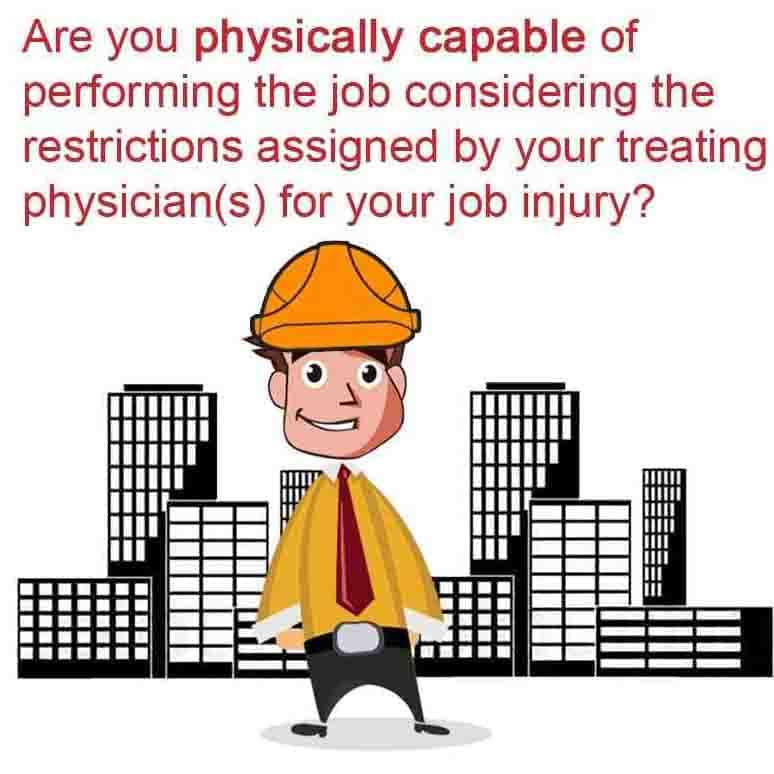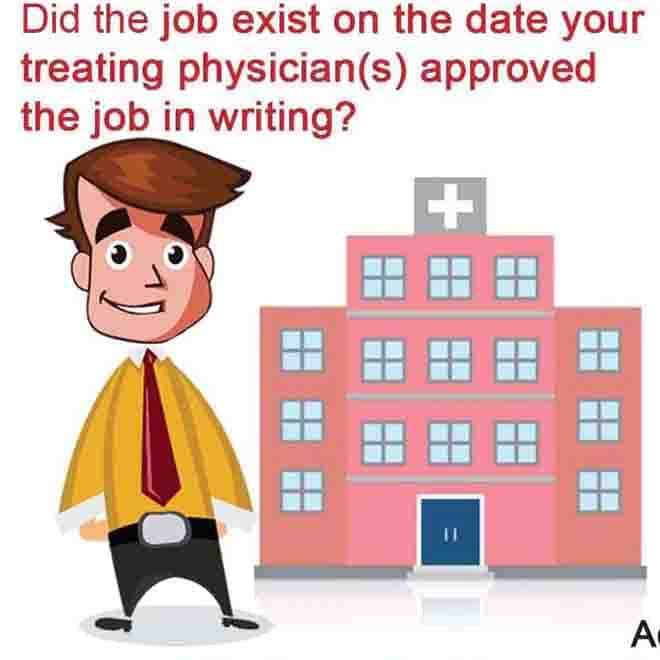Maximizing Your Settlement


- the existence of a suitable job ( considering your age, experience, and education) within your physical restrictions assigned by your doctor and within a reasonable geographic region;
- the amount of wages you can expect to earn in that position;
- an actual position available for that particular job at the time you receive notification of the job’s existence.

- the existence of a suitable job ( considering your age, experience, and education) within your physical restrictions assigned by your doctor and within a reasonable geographic region;
- the amount of wages you can expect to earn in that position;
- an actual position available for that particular job at the time you receive notification of the job’s existence.


Gather as many documents and witnesses you can to help you prove what the proposed job is really about. Print out the actual job description online, call the potential employer to express your sincere interest in the job, apply for the position, and gather as much information on the phone and at the job interview about the physical, education, and experience requirements of the job and pay rate as possible. Keep a journal to document the date, place, time, name of the person you spoke with, and what they said about the actual position as compared to the job described in the vocational counselor’s labor market survey. Save a copy of your job applications with these prospective employers. Photograph it with your phone, if necessary. Hopefully, you get the job, but if you do not, at least you will have a better idea of what the job is about.


You must investigate all Labor Market Survey Positions. Below is a Non-Exclusive List of issues to consider when investigating the Labor Market Survey positions.
Jump to:
- What type of work (physically, educationally, and by training) were you capable of doing before the work accident and related disability?
- What type of work (physically, educationally, and by training), are you capable of doing after the work accident and related disability?
- Physical limitations Assigned by Your Treating Physician(s)
- Education, training, or skill: Do the Labor Market Survey positions(s) fall outside of your education, training, or skills?
- Did the job exist on the date you were made aware of it?
- Where is the actual proposed job located?
- Actual Wages Paid. Is the proposed job a full-time job?
- What type of work (physically, educationally, and by training) were you capable of doing before the work accident and related disability? Considering your condition before the accident, would you have been capable of doing the positions in the Labor Market Survey? If not, what education, training, skill or physical ability, etc. did you not have that prevented you from doing the position?
- What type of work (physically, educationally, and by training), are you capable of doing after the work accident and related disability? Considering your condition after the accident, are you physically and mentally capable of doing the position(s) in the Labor Market Survey? If not, what education, training, skill or physical ability did you not have that prevents you from doing the position? Is your employer of injury or the prospective LMS employer willing to provide you with the education, training, or skill that is required to do the prospective job?
- Physical limitations Assigned by Your Treating Physician(s): Do the Labor Market Survey position(s) fall outside of the restrictions placed on you by your treating physician(s)?
- Treating Physician(s) disapprove job(s)? Physician(s) approve job by signing the job description?
- If physician(s) approved the prospective job(s) by signing the job description, did he add any additional limitations to the job description?
- Is the position presented to physician for his signature an accurate description of the physical requirements of the actual position? Did your job interview with the LMS prospective employer or the actual description from the prospective employer’s website (and conversations over the phone with employees at the prospective employer) indicate the job requires physical abilities you do not have? Did you document the name, job title, and phone number (get a business card) of the person you spoke with at the prospective employer? Did you print out the actual job description from the prospective employer’s website? Would your physician(s) have approved of the actual position had he known of the additional requirements, if any?
- Did all of your treating physicians approve of the positions? If not, why not?
- Education, training, or skill: Do the Labor Market Survey positions(s) fall outside of your education, training, or skills? Is the position presented to you by the vocational rehabilitation counselor an accurate description of the education, skill, and training requirements of the actual position? Did your job interview of the LMS prospective employer or the actual description from the prospective employer’s website (and conversations over the phone with employees at the prospective employer) indicate the job requires education, training, or skills you do not have? Did you document the name, job title, and phone number (get a business card) of the person from the prospective employer you spoke with about the job? Did you print out the actual job description from the prospective employer’s website? Would the vocational counselor have approved the position had it been accurately described?
- Did the job exist on the date you were made aware of it? Did it exist on the date your treating physician(s) approved of it? If not, when was it filled or why is it no longer available?
- Where is the actual proposed job located? Is it beyond 30 miles? Do you have transportation to get to the proposed job? Did you have transportation to the job of injury? If so, how is the proposed job different? Did you walk to your job of injury but now you will be forced to purchase a car to get to the proposed job? Will you be required to use your car on the proposed job? Does your doctor know about the driving component of the job? How does your doctor feel about your driving to or on the job?
- Actual Wages Paid. Is the proposed job a full-time job? A part-time job? Does the starting position really pay what the vocational counselor says it pays? Is it a speculative commission only position but presented to you as an hourly or salary position?

